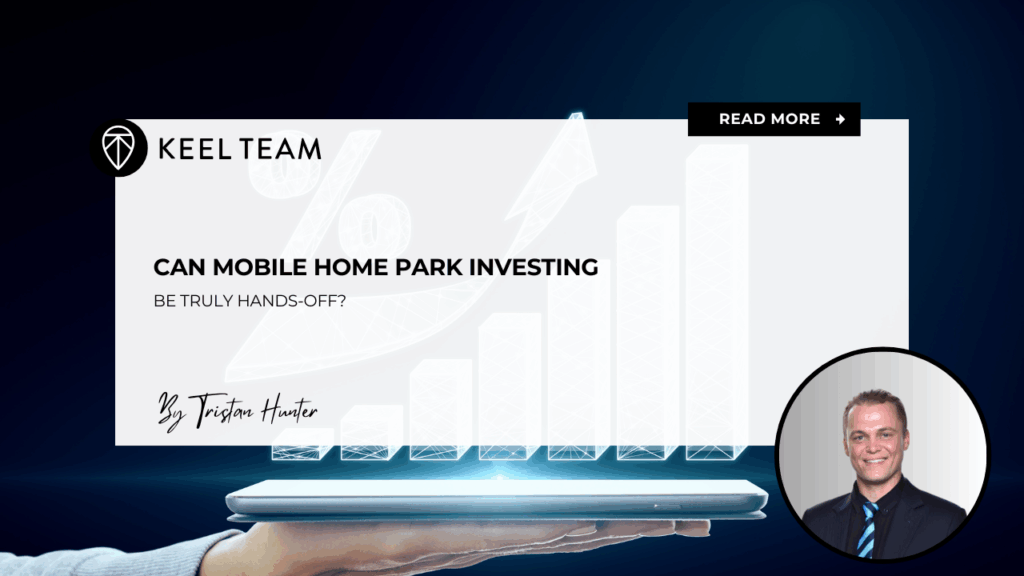Can Mobile Home Park Investing Be Truly Hands-Off?
-
 Tristan Hunter - Investor Relations
Tristan Hunter - Investor Relations

Passive income is one of the main reasons investors explore real estate syndications. Among the available options, mobile home park investing has gained attention for its potential to generate consistent returns while providing much-needed affordable housing. However, many investors still ask a key question: can mobile home park investing really be hands-off?
While mobile home park investments are often marketed as passive, the reality depends on the structure of the deal, the sponsor’s management approach, and the investor’s level of involvement. Let’s explore what “hands-off” truly means in this context and what investors should understand before committing capital.
Understanding the “Hands-Off” Promise
When people refer to mobile home park investing as hands-off, they typically mean an arrangement where someone else handles day-to-day operations — tenant management, rent collection, maintenance, and capital improvements.
In syndications or fund-style structures, the general partner (GP) or sponsor manages the property and executes the business plan. The limited partners (LPs) contribute capital and share in profits, ideally without dealing with operational headaches.
However, “hands-off” does not mean “set it and forget it.” Even in a passive setup, investors still play an active role in the beginning — during the due diligence and sponsor selection stages — and must stay informed throughout the life of the investment.
Download our FREE eBook on the Top 20 things to know BEFORE investing in mobile home parks!
The Structure That Enables Passivity
How Syndications Make Passive Investing Possible
In a mobile home park syndication, multiple investors pool funds to purchase and improve one or more communities. The sponsor identifies the property, arranges financing, and oversees operations. The limited partners receive periodic updates, distributions, and tax documentation (often via K-1 forms).
This structure is what makes mobile home park investing largely hands-off for passive participants. LPs don’t handle resident calls, oversee contractors, or negotiate with utility companies. Instead, their focus is on evaluating the sponsor’s track record, understanding the underwriting, and monitoring performance reports after investing.
Why Sponsor Quality Matters
The sponsor’s competence, transparency, and integrity are what determine whether your experience truly feels passive. A sponsor with strong operational systems and clear communication can make investing smooth. Conversely, poor management or inadequate reporting can make a passive investor feel uncomfortably out of the loop.
Where the “Hands-Off” Approach Has Limits
Even with a capable sponsor, there are still touchpoints where investors should stay engaged.
1. Initial Due Diligence
Before investing, passive investors must evaluate both the deal and the sponsor. Reviewing offering memorandums, private placement memorandums (PPMs), and pro formas takes time. Investors should understand the market, business plan, and projected returns.
This stage is anything but passive — it’s where you decide who will manage your capital and how it will be used. Taking shortcuts here can undermine the very “hands-off” experience you’re seeking later.
2. Ongoing Communication and Reporting
Sponsors typically send quarterly or monthly updates detailing occupancy, collections, and capital projects. Even though you’re not managing operations, it’s wise to read these updates and ask clarifying questions. This ensures transparency and helps you stay aware of how the business plan is progressing.
A sponsor who welcomes investor communication without overwhelming them strikes the right balance for a passive experience.
3. Market and Regulatory Shifts
Mobile home park performance depends on local market dynamics — lot rent regulations, utility costs, or tenant laws may shift over time. While sponsors handle these challenges directly, being informed helps investors understand why certain financial outcomes might vary from projections.
Remaining educated about broader trends helps maintain realistic expectations.
What Truly Passive Investors Should Look For
To achieve a hands-off experience, choose investments structured to minimize your time involvement while maintaining your confidence in oversight.
1. Proven Operational Systems
Look for sponsors who manage multiple mobile home parks successfully. They should have property management systems, standardized resident screening, and maintenance protocols. Efficient operations reduce risk and protect returns.
2. In-House or Trusted Third-Party Management
Some sponsors use in-house teams to manage communities, while others partner with experienced third-party operators. In both cases, the goal is consistent, professional execution. The right management team is key to making the investment feel passive.
3. Regular and Transparent Reporting
Quarterly financial reports, occupancy updates, and renovation progress summaries help investors feel confident without having to dig for information. Clear, concise reporting is one of the most underappreciated aspects of a truly passive investment.
4. Conservative Underwriting
A sponsor who underwrites conservatively — using realistic rent growth, expense assumptions, and exit cap rates — helps manage expectations. Passive investors should prefer realistic projections over aggressive ones that may lead to disappointment later.

Common Misconceptions About Passive Mobile Home Park Investing
Misconception #1: “Once I Invest, There’s Nothing to Do.”
In reality, you’ll need to review documents, confirm ACH payment setups, read quarterly updates, and monitor capital calls or distribution notices. While minimal, these administrative tasks still require occasional attention.
Misconception #2: “Every Syndication Is Passive by Default.”
Not all mobile home park investments are structured the same way. Some “joint venture” deals may require more investor involvement or approval on key decisions. Make sure you understand your voting rights and responsibilities before investing.
Misconception #3: “All Sponsors Operate the Same Way.”
Sponsor quality varies significantly. Two groups can buy similar properties but deliver very different results. The difference often lies in operational discipline, resident management, and transparency — all of which affect how passive your experience truly feels.
The Role of Technology in Passive Investing
Modern sponsors use property management software, online investor portals, and automated reporting systems to enhance transparency.
Platforms like InvestNext or Juniper Square allow passive investors to log in, review documents, track distributions, and view updates at their convenience. This technology has made mobile home park investing more accessible and genuinely passive than in previous decades.
However, even with automation, investors should still engage occasionally — especially when a refinance, sale, or major capital event occurs.
How Returns Can Be Generated Without Active Involvement
Mobile home park investments can produce returns from multiple sources:
- Cash flow: Distributions from lot rent after expenses and debt service
- Appreciation: Increased property value through improved operations or rent growth
- Principal paydown: Reduction of loan balance over time
- Tax benefits: Depreciation and cost segregation studies that can defer taxable income
Sponsors manage these components on behalf of investors, allowing passive participants to benefit from professional execution without having to oversee the process themselves.
Again, while these mechanisms can potentially deliver strong outcomes, no returns are guaranteed, and every investment carries risk.
The Balance Between Passive and Informed
The ideal passive investor stays informed but not involved in daily details. You don’t need to manage tenants or vendors, but you should still understand:
- How performance compares to the original projections
- When major capital events (refinance, sale) are expected
- How distributions and tax documentation are handled
This informed-but-hands-off balance gives investors peace of mind while allowing sponsors the autonomy to execute their business plans effectively.
Key Takeaways for Investors Seeking True Passivity
- The right sponsor is everything. Their systems and communication style directly influence how passive your experience will be.
- Expect some involvement at the beginning. Reviewing documents and understanding projections takes time.
- Stay informed, not involved. Regularly reading updates keeps you connected without requiring operational input.
- Use technology to your advantage. Investor portals and reporting tools streamline communication and transparency.
- Remember that passive doesn’t mean risk-free. Markets fluctuate, and outcomes can differ from expectations.
Final Thoughts
So, can mobile home park investing be truly hands-off?
In many cases, yes — to a large extent. Passive investors in well-structured syndications can enjoy regular income, tax benefits, and potential long-term growth without managing the day-to-day operations themselves.
However, the “hands-off” experience depends heavily on sponsor quality, deal transparency, and your willingness to perform due diligence up front. Staying engaged at key points ensures that your investment remains not only passive but also well-informed.
As with any real estate investment, outcomes vary and no results are guaranteed — but with the right structure and team, mobile home park investing can provide a genuinely low-maintenance path to building long-term wealth.
Are you looking for MORE information? Book a 1-on-1 consultation with Andrew Keel to discuss:
- A mobile home park deal review
- Due diligence questions
- How to raise capital from investors
- Mistakes to avoid, and more!
Disclaimer:
The information provided is for informational purposes only and is not investment advice or a guarantee of any kind. We do not guarantee profitability. Make investment decisions based on your research and consult registered financial and legal professionals. We are not registered financial or legal professionals and do not provide personalized investment recommendations.

Tristan Hunter - Investor Relations
View The Previous or Next Post
Subscribe Below 👇




